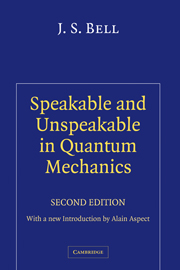Book contents
- Frontmatter
- Contents
- List of papers on quantum philosophy by J. S. Bell
- Preface to the first edition
- Acknowledgements
- Introduction: John Bell and the second quantum revolution
- 1 On the problem of hidden variables in quantum mechanics
- 2 On the Einstein–Podolsky–Rosen paradox
- 3 The moral aspect of quantum mechanics
- 4 Introduction to the hidden-variable question
- 5 Subject and object
- 6 On wave packet reduction in the Coleman–Hepp model
- 7 The theory of local beables
- 8 Locality in quantum mechanics: reply to critics
- 9 How to teach special relativity
- 10 Einstein–Podolsky–Rosen experiments
- 11 The measurement theory of Everett and de Broglie's pilot wave
- 12 Free variables and local causality
- 13 Atomic-cascade photons and quantum-mechanical nonlocality
- 14 de Broglie–Bohm, delayed-choice double-slit experiment, and density matrix
- 15 Quantum mechanics for cosmologists
- 16 Bertlmann's socks and the nature of reality
- 17 On the impossible pilot wave
- 18 Speakable and unspeakable in quantum mechanics
- 19 Beables for quantum field theory
- 20 Six possible worlds of quantum mechanics
- 21 EPR correlations and EPW distributions
- 22 Are there quantum jumps?
- 23 Against ‘measurement’
- 24 La nouvelle cuisine
19 - Beables for quantum field theory
Published online by Cambridge University Press: 11 April 2011
- Frontmatter
- Contents
- List of papers on quantum philosophy by J. S. Bell
- Preface to the first edition
- Acknowledgements
- Introduction: John Bell and the second quantum revolution
- 1 On the problem of hidden variables in quantum mechanics
- 2 On the Einstein–Podolsky–Rosen paradox
- 3 The moral aspect of quantum mechanics
- 4 Introduction to the hidden-variable question
- 5 Subject and object
- 6 On wave packet reduction in the Coleman–Hepp model
- 7 The theory of local beables
- 8 Locality in quantum mechanics: reply to critics
- 9 How to teach special relativity
- 10 Einstein–Podolsky–Rosen experiments
- 11 The measurement theory of Everett and de Broglie's pilot wave
- 12 Free variables and local causality
- 13 Atomic-cascade photons and quantum-mechanical nonlocality
- 14 de Broglie–Bohm, delayed-choice double-slit experiment, and density matrix
- 15 Quantum mechanics for cosmologists
- 16 Bertlmann's socks and the nature of reality
- 17 On the impossible pilot wave
- 18 Speakable and unspeakable in quantum mechanics
- 19 Beables for quantum field theory
- 20 Six possible worlds of quantum mechanics
- 21 EPR correlations and EPW distributions
- 22 Are there quantum jumps?
- 23 Against ‘measurement’
- 24 La nouvelle cuisine
Summary
Introduction
Bohm's 1952 papers on quantum mechanics were for me a revelation. The elimination of indeterminism was very striking. But more important, it seemed to me, was the elimination of any need for a vague division of the world into ‘system’ on the one hand, and ‘apparatus’ or ‘observer’ on the other. I have always felt since that people who have not grasped the ideas of those papers … and unfortunately they remain the majority … are handicapped in any discussion of the meaning of quantum mechanics.
When the cogency of Bohm's reasoning is admitted, a final protest is often this: it is all nonrelativistic. This is to ignore that Bohm himself, in an appendix to one of the 1952 papers, already applied his scheme to the electromagnetic field. And application to scalar fields is straightforward. However until recently, to my knowledge, no extension covering Fermi fields had been made. Such an extension will be sketched here. The need for Fermi fields might be questioned. Fermions might be composite structures of some kind. But also they might not be, or not all. The present exercise will not only include Fermi fields, but even give them a central role. The dependence on the ideas of de Broglie and Bohm, and also on my own simplified extension to cover spin, will be manifest to those familiar with these things. However no such familiarity will be assumed.
Information
- Type
- Chapter
- Information
- Speakable and Unspeakable in Quantum MechanicsCollected Papers on Quantum Philosophy, pp. 173 - 180Publisher: Cambridge University PressPrint publication year: 2004
Accessibility standard: Unknown
Why this information is here
This section outlines the accessibility features of this content - including support for screen readers, full keyboard navigation and high-contrast display options. This may not be relevant for you.Accessibility Information
- 6
- Cited by
